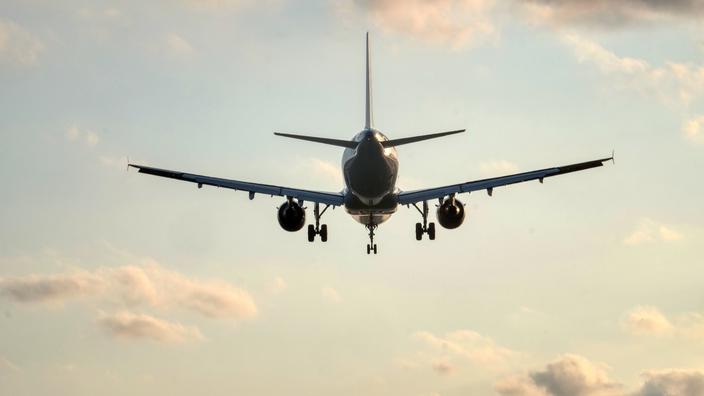Cut the wings to air traffic emissions: Brussels must propose measures on Wednesday to green up intra-European flights, including an unprecedented tax on kerosene, to the chagrin of companies, which fear a "
distortion of competition
" with the rest of the world .
To read also: After the “historic” agreement of the G20 on the world tax, the negotiations continue
The sector is alarmed by the measures that the European Commission will present in its climate plan to reduce the EU's greenhouse gas emissions by 55% by 2030 compared to 1990. Air transport represents around 3%. European emissions.
The absence of taxation on kerosene deemed "
inconsistent
"
In the draft of one of the 12 legislative texts, consulted by AFP, the European executive judges that the absence of taxation on kerosene for air travel "
is not consistent with climate policies
".
Brussels therefore wants to tax it for flights within the EU (including domestic flights): taxation would gradually increase over ten years before reaching the full rate.
The levies would be based on the energy and environmental performance of kerosene, to encourage companies to adopt “
sustainable
”
fuels
(mixed with a small portion of biofuels) which would remain untaxed.
Business aviation (private jets) and freight (cargo planes) would be exempt from the kerosene tax, due to international legal constraints.
In a separate directive, the Commission is also expected to raise the still very modest objective of using “
sustainable fuels
”.
A boon for third countries?
These proposals will be negotiated between MEPs and EU Member States. Belgium, Luxembourg and Austria have already assured their support in an open letter in which they demand "
an immediate application
" of a kerosene tax in the EU, while calling for the same measure to be promoted internationally.
The aviation sector is on the upswing: in a letter to the Commission, eleven EU companies (including Air France / KLM, Lufthansa, TAP) and the European Federation of Transport Workers are alarmed by a "
distortion competition
”. "
Each measure could considerably increase the competitive advantage of non-European companies and non-EU airport hubs
", to the benefit of companies from Turkey, the Gulf, even Chinese and Russian, they warn. And to wave the specter of planes filling their tanks in Turkey or the United Kingdom to circumvent the European tax ...
These measures "
ecologically and economically counterproductive
" will help "
to shift carbon emissions to other regions
" which would see their traffic increase, warns Laurent Donceel, of the A4E federation (Airlines for Europe).
In the European Parliament, "
if competitiveness is not preserved, there will be a debate
", just like on the foreseeable rise in airline tickets, "
which would not be very popular
", predicts MEP Dominique Riquet (Renew, liberals).
A double penalty for the companies?
In their letter, the companies believe that this plan "would
weaken their financial capacities
" to renew their fleets with more economical devices, or to invest in cleaner technologies.
Environmental organizations consider the measures insufficient.
"
Tax rate too low, application too slow, private jets and freight exempt ... enough to undermine any real impact
", scolds Greenpeace, calling on the EU to "
abandon its false solutions like green planes running on unsustainable biofuels
".
In fact, “
apart from kerosene, an ultra-fossil fuel, there is no other way to make planes fly!
Biofuels remain extremely marginal
"and their mode of production, which monopolizes agricultural land and fuels deforestation,"
is highly contested,
"notes Dominique Riquet.
The hydrogen aircraft is not expected for 15 years, and the electric aircraft remains limited by the performance of current batteries.
International Air Transport Association pushes for green fuel
The International Air Transport Association (Iata) says it is “
fundamentally opposed
” to an intra-EU kerosene tax.
Its vice-president for the environment Sebastian Mikosz, during a videoconference on Thursday, instead called for national incentives to produce “
green
”
fuels
and defended the sector's global carbon offset program, CORSIA.
This should, he estimates, reduce the growth of air transport emissions by 77% compared to 2019, on a voluntary basis "
much more efficient than taxes
".
Read also: Climate: Europe toughens its tone, the price of carbon soars
Of course, intra-European flights are already subject to the carbon market (ETS) where airlines can buy and trade the “
pollution rights
” required to offset their emissions.
But until now they have been offered free emission allowances, to help them remain competitive against foreign rivals.
Brussels would gradually like to bury this privilege.
“
We should not tax CO2 twice!
If a company pays its emissions in the ETS and via CORSIA, it should not in addition
“suffer a kerosene tax, alarms A4E, which estimates at 9 billion euros in 2030 the additional cost of the expected regulations.









